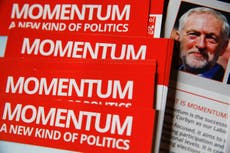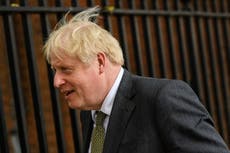As a Labour Party member, I am petrified of the Conservatives’ version of Momentum
Blue Collar Conservatives are trying to portray the narrative that they are the real party for the working class; dare I say it, the real Labour Party. There is a danger they might pull it off

We all have heard about Momentum, the Labour Party grassroots group that was set up explicitly to support Jeremy Corbyn.
Momentum may have played a “pivotal role in mobilising activists”; however after Labour’s general election defeat in 2019, Momentum became an easy scapegoat, with the former home secretary Alan Johnson saying he wants “Momentum gone” and for Momentum to “go back to … student politics.”
But it can be argued that every party has its own version of Momentum. The conservative’s version is Blue Collar Conservatism – a pressure group and parliamentary caucus of 130 Conservative MPs who identify as working-class conservatives. It was founded in 2012 by former cabinet minister Esther McVey and a former Conservative parliamentary candidate for Workington, Clark Vasey. The group meets regularly to share ideas, scrutinise and support the government and champion working people.
All parties deal with factionalism. Some leaders ignore it, and some leaders do what they can to stamp it out. Boris Johnson had to deal with the infighting in the Tory party back in September 2019, when he expelled more than 20 MPs. Perhaps another Conservative rebellion looms as Blue Collar Conservatism support grows.
Blue Collar Conservatism’s aim in the 2019 election was to get as many votes from Labour as possible, by championing working people and developing a conservative agenda to benefit the voters and communities most neglected by Labour. It worked.
Meanwhile, Momentum backs Labour’s vision to redistribute wealth and power away from the few and to the many. During the 2017 campaign, Momentum’s activities were credited with swaying the result in several marginal seats during the 2017 campaign. Its aim in the 2019 general election was to get Jeremy Corbyn elected. It didn't work.
Blue Collar Conservatives reported that they had over a million people watching their virtual conference, which gave voters a voice from some of the forgotten parts of England in the former Labour red wall seats which swung Conservative in 2019. In an article in the Daily Express, Esther Mcvey said: “The conference was always about talking politics to the people – and we’ve done just that.”
We all know the Labour party has an unsavvy split. There are the moderate members, the Tony Blairites, and the cult following of Jeremy Corbyn. In other words, the centre left and the Marxists. The factionalism in our party is unbelievable. Sometimes I think our primary aim is to smear and attack members rather than win elections.
But the prime minister's vision for the future is doing little to win round rebellious Tory MPs. For example, Conservative MP Philip Davies believes the government is acting like “a socialist government rather than a Conservative one” in the way it has handled the pandemic.
Blue Collar Conservatives are trying to portray the narrative that they are the real party for the working class; dare I say it, the real Labour Party. However, their relationship to politics is not mediated through working-class institutions like trade unions and close-knit communities and a sense of belonging. Rather, they have made their political foothold through their support for small business and their belief of laissez-faire politics – letting people get on with their lives.
It’s easy to see why so many people feel connected to Blue Collar Conservatism. Especially in areas like mine, West Yorkshire, where unfortunately Labour failed us on their mercurial stance on Brexit. It’s easy to resonate with Blue Collar Conservatism, because they passionately believe in the strength of the union. Their patriotic views on society are appealing to a lot of people in this country, especially failed Labour voters. It’s something many Labour Party members like myself should be concerned about.






Join our commenting forum
Join thought-provoking conversations, follow other Independent readers and see their replies